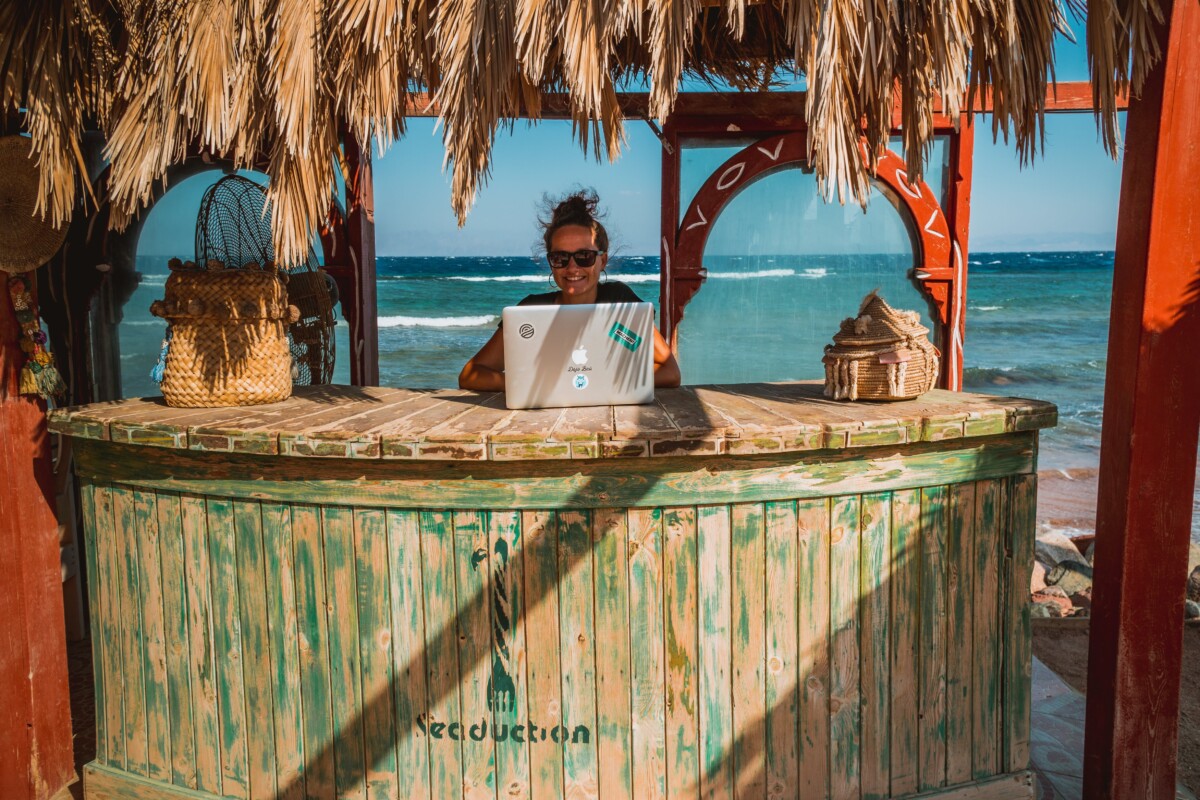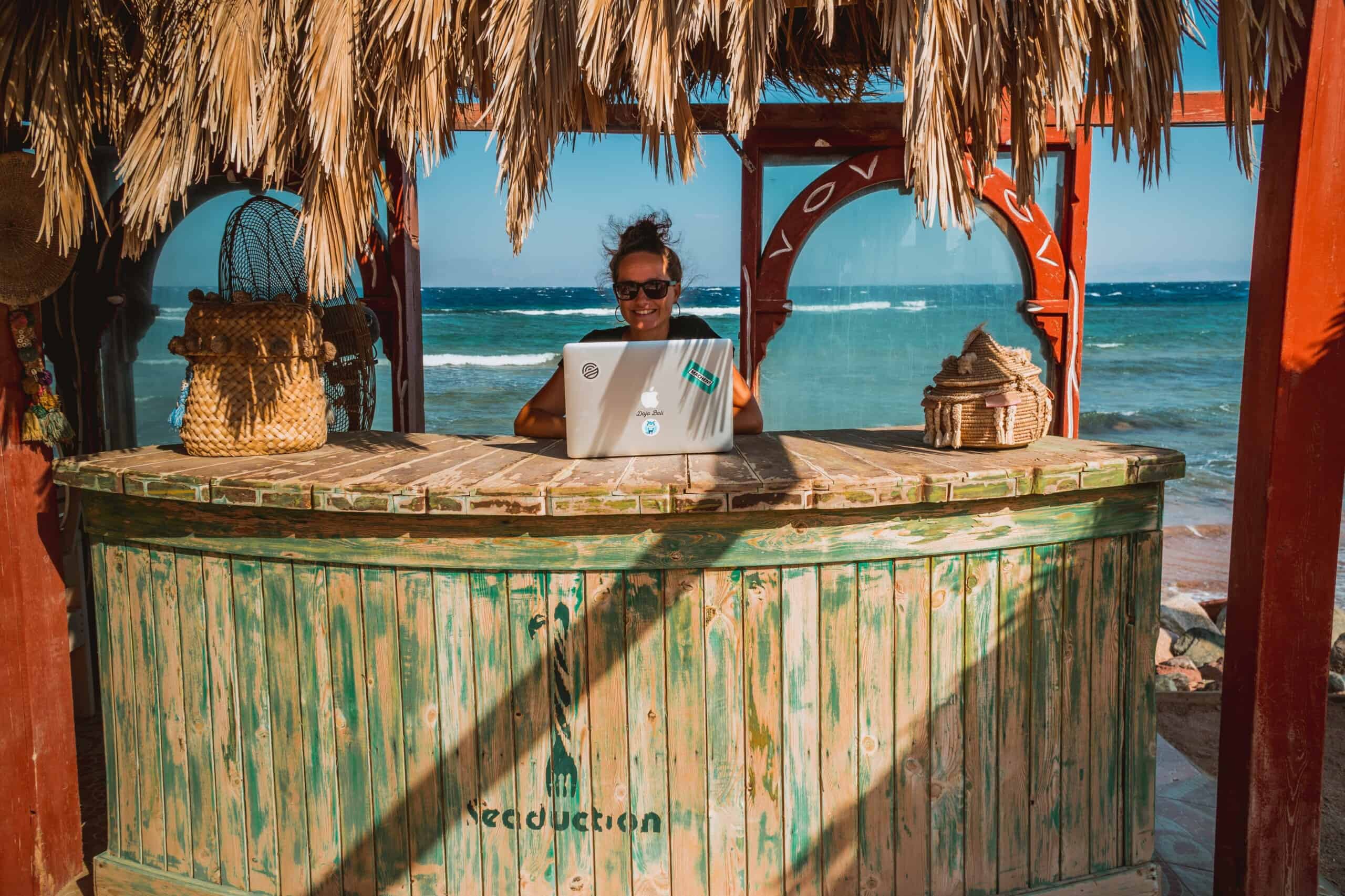To make Wealthtender free for readers, we earn money from advertisers, including financial professionals and firms that pay to be featured. This creates a conflict of interest when we favor their promotion over others. Read our editorial policy and terms of service to learn more. Wealthtender is not a client of these financial services providers.
➡️ Find a Local Advisor | 🎯 Find a Specialist Advisor

The phrase ‘digital nomad’ has been around for a while but has become more widely used than ever in recent years. Traveling the world while working out of a laptop bag sounds amazing, for the person doing it, but digital nomadism has also been criticized.
It’s even been suggested that it’s unethical. Rich westerners taking their tech overseas and working remotely from a beautiful beach while living cheaply at local prices can be a lot more beneficial for the rich westerner than the local economy.
But are all those westerners rich? Do you actually have to be wealthy to become a digital nomad? In the USA, more than in most other rich countries, travel is generally seen as something that costs a lot. The middle class, even those with a solid remote job that can be done from anywhere, often don’t consider themselves wealthy enough to become location-independent.
But working remotely from an exotic location takes many forms. And some of them cost a lot less than others.

Digital Nomad Visas
We’ve talked before, here at Wealthtender, about digital nomad visas. These are the special permits that countries are now giving out that allow those with remote work to live there for a year or more, sometimes tax-free. Everywhere from Bali to Costa Rica are handing out remote work permits that actively encourage long-term visitors from overseas with jobs that can be done remotely.
Far from believing that remote workers somehow damage the local economy, the policymakers in these countries believe they benefit from it, and they are being proved right. It’s been reported that in Barbados, for example, the one-year Barbados visa for digital nomads received over 2,500 applications in its first ten months, bringing in around $6 million directly for the government (the application fee alone is $2,000 for an individual, $3,000 for a family). That was nothing, however, compared to the $100 million in tourism revenue the extra visitors brought in, more than making up for the $70 million drop in tourism-related income during the Covid pandemic.
Do you have to be wealthy to get a digital nomad visa? Not really. Yes, you have to have the application fee upfront, and yes, that can be as much as $2,000 or more in places like Barbados (but is much less in many countries). You also have to prove your income, either as a remote employee or as a self-employed individual, but the income needed is not as high as you might think. It’s currently $50,000 per annum in Barbados, but again, lower in many other countries.
You may or may not have to prove that you also have reserve funds in a personal bank account, depending on the country. Another thing that depends on the country is the way the application fee is charged. You’ll generally find that while there is often a small processing fee to lodge your application, you’ll only pay the actual visa fee if your application is approved. Lastly, you’ll have to think carefully about health insurance. Remote overseas workers generally do not have automatic access to local healthcare services. You’ll need to have health insurance in place or travel insurance that includes healthcare coverage.
If you’re researching your options, it’s worth knowing that these visas are never actually called digital nomad visas. Each country has its own name for them, so you’ll have to dig around a little.
Doing It on the Cheap
For years before digital nomad visas existed, people were happily custom-building their own experiences as digital nomads, often in cheap, southeast Asian and southern European countries. They still are. Living ‘unofficially’ in a country as a digital nomad has both pros and cons. You’re generally doing it on a tourist visa which may require a fair bit of juggling as tourist visas regularly run out. This often requires you to leave the country, often for a specific amount of time, renew your visa, then return on a new tourist visa.
Alternatively, if you want to really embrace the nomadic lifestyle, you can, of course, spend time in a number of different countries each year, never exceeding the stated tourist visa allowance (often 90 days, but sometimes as little as 30 or as much as 180).
Obviously, this requires a certain amount of research and planning, but can also be much more suitable for those with a truly adventurous spirit. As tourist visas are generally calculated per year, it may be possible to simply pick your four favorite places on the planet and spend 90 days in each of them each year, with a few days left over for an annual trip ‘home’.
Doing it this way can be relatively cheap. Tourist visas are often either free or available for a nominal fee. You don’t have to prove income, so you can be earning a fairly low amount as long as you can support yourself in your country (or countries) of choice, and you can pick the extremely low cost of living countries if that’s what suits you overall.
You’ll still need health insurance or, more likely worldwide travel insurance that includes healthcare, and you’ll have to shop around for insurance that lets you travel more or less permanently. You’ll also have to ensure you’re paying any tax you owe in your home country. Many countries do not charge their citizens tax in any tax year that they’re not in the country, or only there for a limited amount of time. The USA, however, is an exception. Americans generally need to file a tax return, and potentially pay some tax, even if they don’t set foot in the US in a given tax year.
Doing It in Style
Want to do the remote-work-while-traveling thing in style, while someone else makes (most of) the arrangements? There are a few great options for you, such as Remote Year. This company can organize a year on the road for you as a digital nomad, taking in a new city each month, traveling with like-minded people, and organizing everything from travel documents to co-working spaces along the way. You can dip in with a taster one-month trip, try a four-month adventure, or go for the full twelve-month experience.
The company books accommodation, flights, and transfers. They provide a co-working space within walking distance of your accommodation and effectively give you a built-in community and support network comprised of other remote workers and entrepreneurs who own lifestyle businesses on your trip. One advertised itinerary from Remote Year right now includes one month in each of the following destinations:
- Hanoi, Vietnam
- Chang Mai, Thailand
- Bali, Indonesia
- Osaka, Japan
- Buenos Aires, Argentina
- Lima, Peru
- Medellin, Columbia
- Mexico City, Mexico
- Lisbon, Portugal
- Valencia, Spain
- Marrakesh, Morocco
- Istanbul, Turkey
So again, let’s return to the question, do you have to be wealthy to do this? The total cost of this program is $32,000 for the year, so it isn’t cheap, but the question is, do you currently have outgoings of $32,000 per year in your hometown? Expenses that could be eliminated if you were on the road for the year?
It’s not hard to spend that much (or more) in rent, utilities, and renting co-working space in a major American or Northern European city, so some workers could break even or even be better off financially taking their job on the road for a remote year. Many would argue they’d undoubtedly be better off from the perspective of experience gained, either way.
Considering the digital nomad lifestyle? There’s a lot to think about. But if you have a job you can do (or business you can run) remotely, the opportunities are out there, and, perhaps surprisingly, you don’t need a six-figure income or even a lot of money in the bank, to make it happen.
Related Articles from Wealthtender:
- How Much Income Do You Need in Retirement?
- Your Ultimate Guide to Retirement Income Planning
- Should You Hire a Retirement Financial Advisor?
Karen Banes is a freelance writer specializing in entrepreneurship, parenting and lifestyle. She writes articles, website content, ebooks and the occasional award winning short story. Her work has appeared in a range of publications both online and off, including The Washington Post, Life Info Magazine, Transitions Abroad, Brave New Traveler, Natural Parenting Group, and Copia Magazine. Learn More About Karen
To make Wealthtender free for readers, we earn money from advertisers, including financial professionals and firms that pay to be featured. This creates a conflict of interest when we favor their promotion over others. Read our editorial policy and terms of service to learn more. Wealthtender is not a client of these financial services providers.
➡️ Find a Local Advisor | 🎯 Find a Specialist Advisor

